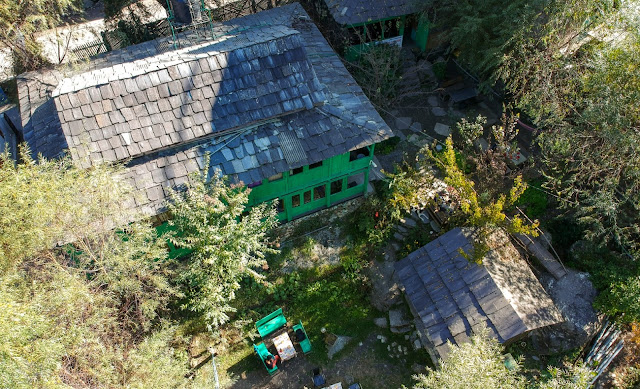Tale of a Guest House
Jibhi: Walks, Coffee and Conversations
“It will augur better, for both of us, if you visit me instead of my
coming to your house; you stay in a Thakur village and my wife belongs to a
lower caste.” I heard one European tell another. Both of them had married
and settled in the villages nearby. I was in Jibhi (Kullu district, Himachal
Pradesh); at the cafe of the Doli Guest House.
Cafes and Guest Houses
like these have become melting point for conversations, silences and – of
course – surprises.
Image: https://kshatra.com/
During my stay I bumped
into 2 people, also travelling alone. We shared of our time amidst mountains
and smiles. When alone, I sat with coffee, paper and pencil as the river and
birds added to the ‘micro-climate’ the Guest House has successfully created. These
places – amidst the Himalayas - possible destinations in themselves, one would
want to visit and revisit to put in time with self and yet to be friends.
Mr. Rana, who owns and
runs the place, is also a surprise – one that uncovers slowly. He was the first
to run a Guest House at Jibhi in 1992; the structure was 30 years old then.
About 10 people came during the initial year and for the next 10 odd years
there was no other tourist facility at Jibhi. Most, if not all, guests during
the initial days were foreigners and they were charged 50/- per night. The room
I stayed at had lines of wood for walls, a bulb hanging in the centre, no
windows but glass at 2 points on the ceiling. These points allowed the daylight
in; a light which had a human feel and one which I could not switch off. The Guest
house remains shut during the winter months while some of the guests who come during
rest of the year end up staying for multiple months!
Coming to the Jibhi of
today I asked him if he is worried that the overcrowding will – to use a strong
term – destroy the place. He described how after home-stay scheme brought out
by the state – about a decade ago - tourism got a major boost in the valley. Today,
9 out of 10 home-stays did not meet the norms! He did not see Jibhi becoming
another Manali and added that not only will the tourism in the valley plateau or
even-out but some players will have to shut shop as financial sustainability
will dictate terms.
Image: https://kshatra.com/
Rana is also concerned
about the ecological sustainability. A board at the Guest House’s entrance
tells us, “In the forests and mountains
the animals do not leave trash, humans do, please behave like animals.”
More than a decade ago he, together with friends, played a crucial role in
conservation of the Pushpabhadra river which flows by the Guest House. They not
only ensured that the plans for the hydro power project (on the river) remained
confined to paper but also introduced trout fish in it! Today he is one of the
leading member of an association which takes care of Jibhi. The association
works with the authorities and amongst else has been able to ban loud music (the neighbour should not be disturbed),
get people to treat sewage in a proper manner and arrange for a guard at the
waterfall (a tourist point). However,
he adds, neither are all properties members – of the association - nor are all
issues discussed openly.
I did come across some
new food and stay places including restaurants with 40+ seats, during my walks;
but Jibhi retains a special feel. A place to go for languorous walks in the
Himalayas as also a take-off point for treks. It is, today, not very different
from how a friend, once an annual visitor, had talked of it. It has a charm and
that something, which can loosely be called ‘ambience’, which puts one at ease.
Not only has Doli Guest House become a name synonymous with Jibhi, it too boasts
of this charm and ‘ambience’. As Sejal Mehta wrote in ‘Stay: Doli Guest House,
Jibhi’, “there’s a familiarity to this
place, which is both healing and buoyant.”
As we sipped his famed jaggery
tea and smoked his home-grown tobacco Rana said that the Guest House has been a
university for him. The bonding with the guests, over the years, has also enabled
him to travel across the globe. Today, he is happy doing his little bit in this
imperfect world. He has plans to develop a facility that will present an
opportunity to guests to live life as people in these hills lived, a hundred or
more years ago.
Image: https://kshatra.com/
Finally, I asked him of the negative reactions he faced during the initial days. He had been told to stop
eating with foreigners for they were looked down as low castes! How did this
resolve? I could not resist. Once they began to earn from the foreign tourists
the caste issue took a back-seat for the locals; he smiled and responded.



Very nice and vivid! Hope we soon travel again, in a carefree and more humane world...
ReplyDeleteThanks . . Haan ji . . Look forward to fun on the move soon . .
Delete"Once they began to earn from the foreign tourists the caste issue took a back-seat for the locals". Good solution to the caste problem!
ReplyDeleteThis appears to be one of those - "all good things happen by chance" waali baat . .
DeleteLights you cant switch off... seems inviting!
ReplyDeleteIndeed inviting . . The room reminded me of an image I had come across during my early school days : of sunlight making the room appear cosy . .
Delete